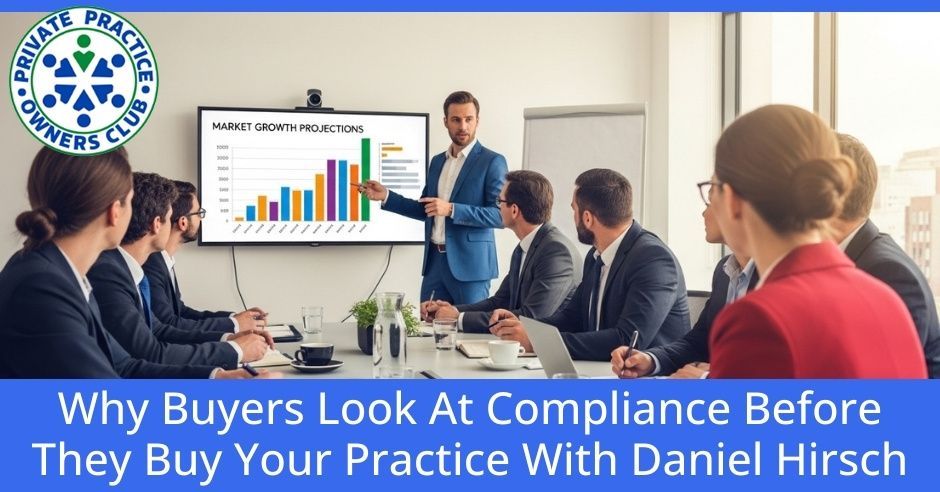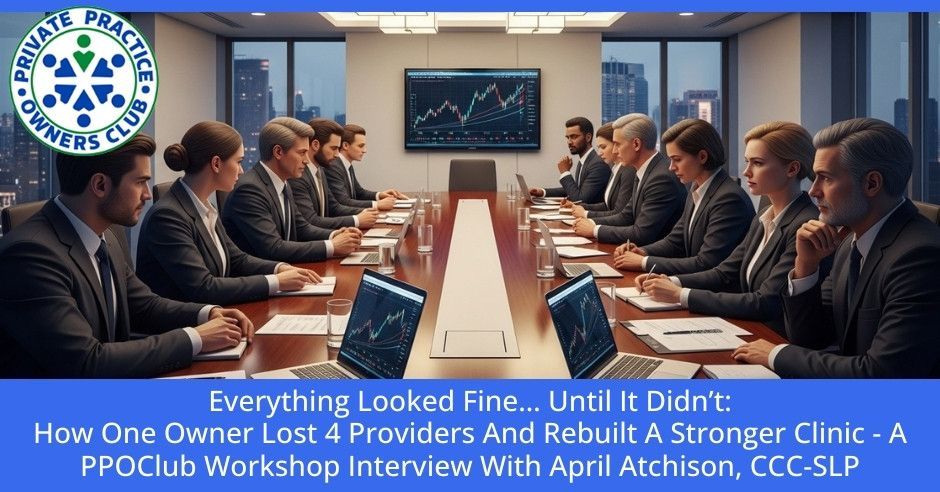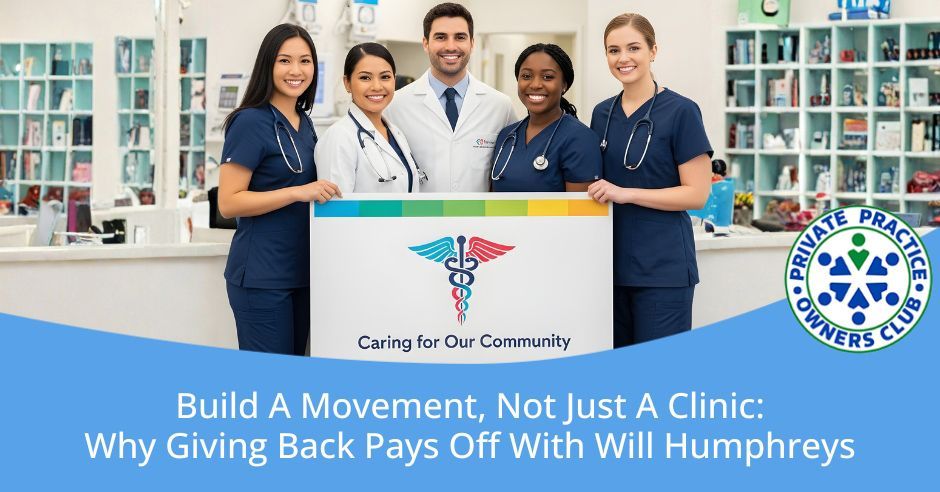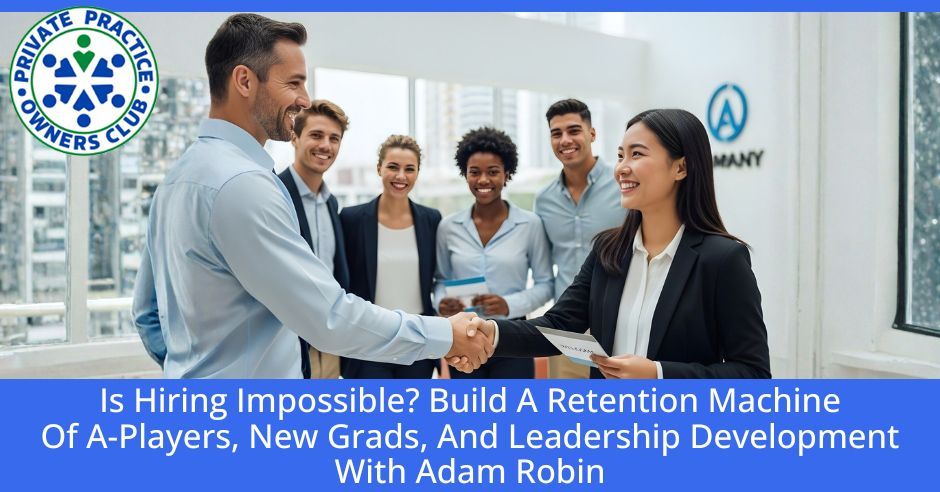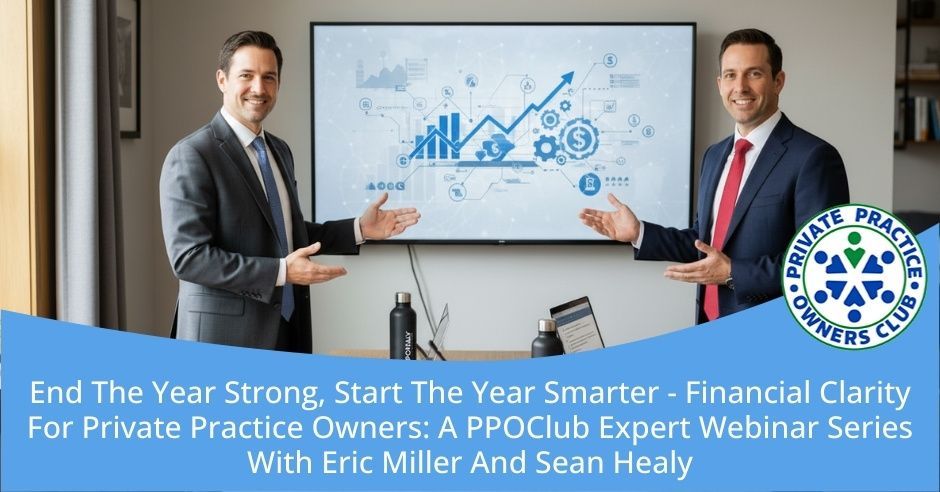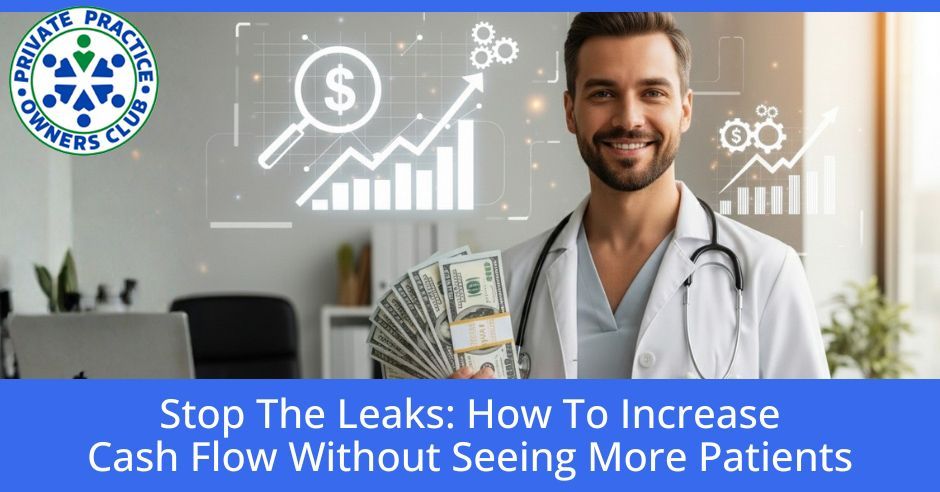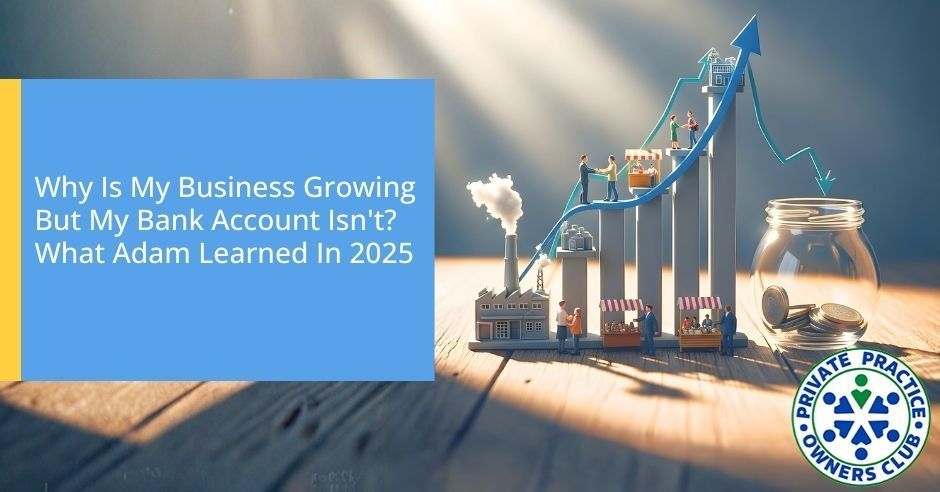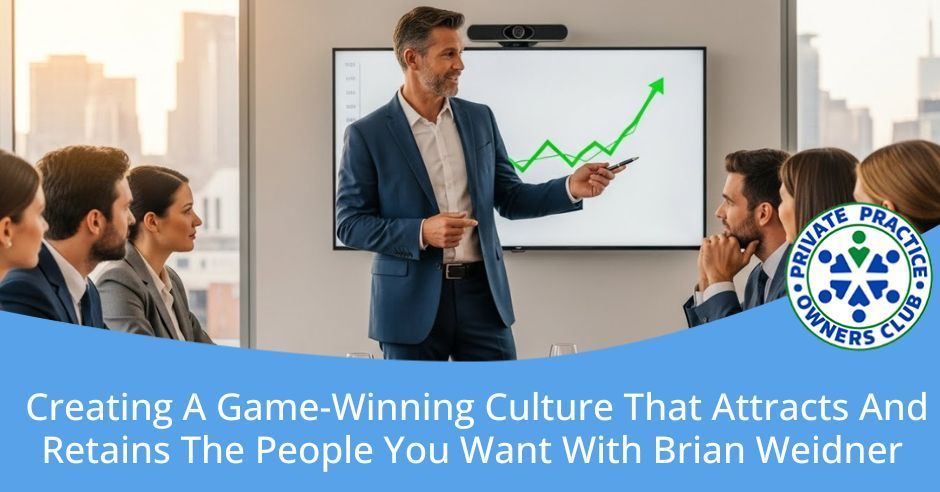Scaling Your Practice Like A Pro — Insights From Investor & Strata PT CEO, Paul Singh
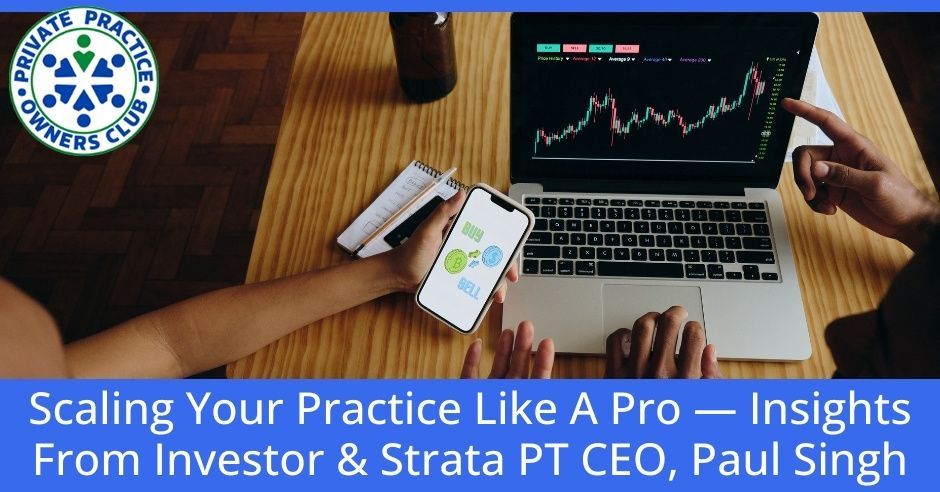
In this powerhouse episode, Dr. Adam Robin sits down with entrepreneur, investor, and unapologetic capitalist Paul Singh, CEO of Strata PT, for an unfiltered conversation on building successful businesses—inside and outside of healthcare.
Paul has invested in over 3,200 companies across multiple industries, giving him a rare, big-picture perspective on what really drives growth. He shares why the core challenges in healthcare mirror those in other industries, and how private practice owners can leverage proven business principles to scale smarter.
They dive into:
● The surprising similarities between healthcare and other industries
● Key business lessons from investing in 3,200 companies
● How Strata PT is helping PT, OT, SLP, and ABA clinics run stronger
● The mindset shifts every owner needs to compete and win
● Why focusing on fundamentals will always beat chasing trends
If you’re ready to think bigger about your private practice and borrow success strategies from the best in business, this is a must-listen episode.
🎙️ Get ready to take notes, take action, and take control of your growth.
And don’t miss the upcoming Private Practice Owners Club Conference where conversations like this go even deeper. Register now at ppoclubevents.com/homepage
---
Listen to the Podcast here
Scaling Your Practice Like A Pro — Insights From Investor & Strata PT CEO, Paul Singh
Welcome to the Private Practice Owners Podcast. We've got an entrepreneur, crazy capitalist. I think he said he called himself before we started recording, Paul Singh with StrataPT. The CEO of StrataPT. You guys might've heard of him. They've been around since March 2010, and they do a lot of cool things to support private practice owners, PTOT speech, ABA clinics, and more. I'm going to lead out by saying that Paul said something super cool before we started recording. He said that Paul has invested in 3,200 different companies.
This guy knows a lot about business, and he said something that was really interesting. He said that, from his experience that healthcare is very similar. When you're comparing different industries, healthcare has a lot of the same challenges that other industries have. We're going to pick Paul's brain. Learn about what he knows about being successful as a business owner, and then talk a little bit about Strata.
---
What's up, Paul? How are you?
I'm living the dream. I got four great kids, and my wife's cool. I'm having a good time. I cannot complain.
Where are you located? Where do you live these days?
Home base for me is Northern Virginia, just right outside of DC. If you've ever flown into Washington, Dallas airport, or whatever, we're like twenty minutes from there. I could get to downtown DC in like 35 minutes from here. Fun little place to be. I grew up around here. My extended family, everybody's all around here. It's great. I got access to a great airport, so I can get anywhere else I need to be really quickly.
The Entrepreneurial Journey: Paul's Background And Business Philosophy
Listen, you've got tons of experience. At least a little bit about being successful as a business owner. I'd love to hear more about you. Just like who you are. What is your background? I'd love to hear your take on business. We can start talking about like some of, maybe some of the interesting things that you're seeing in the business world these days.
I’m happy to talk about whatever you like. I grew up in this area. I'll give you, like, maybe the one-minute condensed version. Grew up in this area, went to high school here, and went to George Mason University here. I will tell you that by the time I was coming of age, eighteen years old in the mid to late ‘90s, I thought that the way you made money was you traded time for money or a thing for money. The concept of the internet and technology was foreign. Back then, half the people thought the internet was a fad.
I got an internship at this place called AOL, America Online. I think at the time, they probably had fewer than 300 people. That one summer internship changed everything for me because there were two lessons I learned there. Number one, technology is fascinating because you can build anything for anybody from anywhere. That was lesson number one. Lesson number two was one of the things that they talked about a lot that summer at AOL was this idea that nobody at that company at that time was smarter than anybody else on the planet.
Technology is fascinating because you can build anything for anybody from anywhere.
The only reason companies like AOL succeeded more than other competitors at the time is that they were willing to try more stuff in a given time period. Operationally, they looked at a 52-week calendar in the year as 52 things they could try, which sounds so basic, but I would argue. It shaped the rest of my professional career because now it wasn't about being right or wrong or spending six months thinking about an idea. I was like, “What's the fastest way I can test out this thing I want to try out? Whether it was me trying to start a business, or maybe I wanted to go invest in something.
Let's try it out. Let's just control the risk. What's the risk? Let's go.” Anyway, I grew up here, got an internship there. That very thinking got me to accidentally start my first business, which ultimately turned into a bunch of data centers. There was web hosting and stuff like that in the late ‘90s. By 2004, I had built six million square feet of data centers here in Virginia. We still operate those. Lots of traffic, lots of customers, that keeps going. Same mindset. I just then did that. I built the business up, got a great team running it.
We don't have any outside capital, just all bootstrapped. Second business was I started investing in a bunch of startups. I was hanging around websites like Hacker News. It's like a website for nerds to talk to other nerds. I met this guy on there. I want to say it was like 2008, maybe, maybe it was 2009, something like that. Anyway, I met this guy, and he was like this broker guy at Blackstone or something fancy bank or whatever. He was on this message board like, “I'm building this thing.” I cold emailed the guy, and I was like, “I think that's pretty cool. Here's a check for $50,000, but you can only cash it if you quit your job.”
I didn't know what I was doing. I was like, “Whatever. Let's try it.” He did it. I'd started making little investments like that. My buddies started wanting to get into it. I'm like, “I don't know how to manage other people's money, and I don't want to make like happy hours weird. Why don't you just invest in the same things?” Long story short, that turned into a venture capital firm. We had to formalize that. That was my second, we grew that up, and that's still running. I got a great team there. The third business was an e-commerce company for moms.
My wife and I have four kids. I was like, “How come I cannot go to CVS and buy like a pregnancy-safe deodorant or whatever?” Things like that. We started building that. As that grew fast, I'm like, “Who are these people sending free breast pumps and stuff to my wife? How does that work?” I learned all the acronyms of this industry. It was like, “RCM, DME. What is all this?” That led me to Strata. Now, the last thing I'll say before I stop talking about myself is that it's easy for me to tell you that story because it talks about the wins.
What you don't hear, because nobody ever wants to hear it, is that there were a million little experiments along the way of, “What if I tried that?” For me, I will come up with an idea and kill it within a week. The way that people who know me, the way that they'll experience this is if somebody ever says like, “I've been thinking about this thing for like three months now.” I'm like, “No. I'm going to stop you right there. That's dumb. I don't want to hear it anymore.”
I don't mean to be cruel, but my life lesson here, really on this topic, is literally this. It's like, “If I asked you for $20,” chances are, if we weren't strangers or whatever, you'd be like, “Paul, here you go,” or “I'm sorry,” chances are, you'd be like, “No, even if I knew you, no. I don't know if I might ever get it back.” If I said to you, “How about you get a cup of coffee?” Chances are, you say yes to that. I argue it should be the opposite. I think you should be loose with the money. You can always make it back on time. That you cannot get back. It's like, stay no to the coffee.
Let the guy borrow the $20. That's so opposite to what most people would do. Most people would hem and haw over the money and be like, “Listen, I don't have any with me.” They make all these excuses and bend over backwards. If I said, “Let's go get coffee,” like, “Yeah, let's go.” That twenty-minute coffee is going to cost them an hour commute round-trip. It's going to cost lost opportunities, things that they can never get back. Anyway, that's the background. I just tripped and stumbled my way forward. The only reason I'm successful is that I'm probably more, I'm not afraid to look like an idiot.

Time Vs. Money: The Ultimate Business Equation
Dude, you're dropping so many things. I'm taking notes. I had a call. We have a virtual assistant staffing agency. We help place Filipino workers inside practices to help them scale out their operations effectively. The guy's like, “Should I hire a front office person or a back office person?” I'm like, “What do you think your business needs?” He said, “If I had the money, I would probably do both. I think they need both.” I was like, “There's your answer.” It's so refreshing to hear you say that, because, like somebody like you, you have so much.
You have a lot more experience than I have, and what you've done is like super cool. I preach this to my clients all the time. It's like, “You have to value your time more than you value your money.” It's like, let go of the money, and the money will come back. If you occupy your time with low-leverage tasks continuously, you're just always going to be bootstrapped. I think James Wedmore is a guy that I quote all the time. He says, “Value your money more than your time, you'll have neither. If you value your time, then your money will have an abundance of both.” It's really cool to hear you say that.
Your experience is correct. Most people will be that way, and it's natural. We don't teach this in school. We probably should. Here's the thing. Business itself, like all the stories of business are like total clickbait. You look at it like Shark Tank, and you look at all these popular shows, and they make it sound like risk. Like, “This guy, this gal, she like risked everything to start this business.” You're like, “God, that makes for great clicks.” Lots of clicks on that.
That's probably not exactly what happened. Often, what happened is they were running a side job to power the business while they were getting the business off the ground. It's not some rich uncle somewhere. There's always such a story. The way I think about it is that business itself really is just a math problem. Not even like the heart. It's not like a hard, like calculus three math problem. It's literally like, “If I know that like two plus two equals four, but that first two that I'm adding in, if I could have somebody else do that, and then I could like make the second two a four myself. Now I got a six over here.”
Business itself is just a math problem.
The fancy term for this, and I would argue the most important business concept that is not taught in any university anywhere in the United States and probably not even taught in any university anywhere else on the planet, is the concept of capital allocation. Capital in the sense of time, effort, money, all of the above, people. I think if you were to go back and look at the most successful business owners, business people, it doesn't matter if they're the CEO or like a general manager of a department, it doesn't matter.
If you look at the most successful business people of the last 50 years, they all have different methods of getting to where they want, but the one common trait they all have is this incredible ability to deploy capital well and deploy that where they will get the most benefit for it. Everybody would agree with me. If there was a way that I could put a dollar into something and get ten out, of course, we would pile drive into it. Coming back to your point, that's how people should be thinking about it. I'm just pretending to be that guy.
When I was talking to that same person you were driving to, it's like, look, we both agree that if you had unlimited money, you'd just staff up everywhere. We all agree with that. Now the question becomes if I put a constraint on you and said, “You can only pick one. Which one gets you more measurable output?” Whatever's important could be measurable revenue. It could be faster phone pickup times.
Whatever you think you need as a CEO of that business. Anyway, I think here's the harsh truth on this topic. Money is rarely the actual gating item to starting or growing a business. Yet it is the number one reason everybody will tell you they cannot do something well. Listen, “I cannot afford four.” You're like, “That's not the question. The question is, I never want you to have the four if you cannot afford them. Where should I place one person to get you the money back or the one X back?” I think a lot of people just don't.

Unpacking Practice Owner Challenges: Beyond The Money Myth
The question is, what do you think if it's not money, what do you really feel like is the most common restraint for small businesses? Maybe if you can be specific to practice owners, that'd be incredible.
I think most practice owners that I meet, and I'm going to say this is true of any entrepreneur I meet, but let's just use practice owners, and to be clear, they're all the same anyway. They're all entrepreneurs. Most practice owners are romantic about their business. They're just overly romantic about their business. It comes from a good place. They probably went to school to help people. That's a good thing. I like that. That's great, but they almost don't realize that you have to have two hats. I'm just a visual guy. I'm always drawing on the whiteboard and stuff.
The way I have to think about it is when you're the clinician, you have to put your clinical hat on. “Let's do this. Let's get that outcome.” Whatever, right? Once we start talking about business, you've got to take that hat off and put your business hat on because there are two different ways of thinking. I think most practice owners don't do that. What they do is they're trying to load up their patients, their calendar, because that's how they're going to make their money. They'll get the bill, get the payments.
They don't realize that in those, they got to do this fast context switch between the clinical version of themselves and the business owner themselves, because like some of the things they end up doing because they don't do that are the things that would totally get them fired if they were employed by somebody else that was like that. They're overly romantic about it, and they end up falling into the spiral. It spirals fast, and it leads eventually to burnout. Along the way, they hit frustration. “Why am I so busy?” I guess here's the bottom line.
Most practice owners will fail. Most businesses fail. The ones that succeed end up creating a job for themselves and never actually get out of it. The very few that make it out, like they were, in hindsight, good capital allocators. It's funny. I go see a PT. I do a lot of try and run a marathon every quarter. I go see a local PT, but I don't tell them what I do for work. He has no idea. He doesn't use our product yet or anything like that, but I don't tell them what I do. It's so fascinating watching him because I've been going to him for a while.
Most practice owners will fail. Most businesses fail; the ones that succeed often create a job for themselves.
He opened up a shop near my kid's school. I'm like, “I'll go over there.” It's fascinating to me. He's a great PT. His clinic's always busy, but like I asked him, “You got excited about summer? What's up? Any fun vacations?” Like, “No, man, I cannot take time off. I don't make any money.” I thought to myself, “That is insane.” The guy who sold me my house five years ago, I haven't talked to the guy in five years.
That guy markets to me once a quarter, sends me a magnet on the fridge, with the local high school football calendar. He's targeting me on Facebook. I bought one thing through that guy five years ago, and the guy markets to me more than my PT. The guy doesn't send me text reminders saying, “I'm looking for you. Your plan of care was six visits. I know you were busy last week.” He doesn't do any of stuff but he doesn't do it because it's not that he's not smart. He falls into this spiral. He's occupied. I think practice owners need to make a decision. The minute your calendar is about two-thirds full, I would argue you need to make a decision.
I don't care how you staff it, but you need to make a decision on what the next hire is going to be. Is it going to be that the next one third of the patients are going to have like some, I'm making this up, some PRN, some like part-time clinician that you're going to like load up their schedule so that your third stays empty or is the next hire going to be front desk admin, something like that, so that you can jam up the net, that full calendar. They're worried about, like, “Let's make sure we send text reminders. Let's call. Let's do this. Let's do that.” They don't do that. They just get hung up.
I can tell you why I think that happens just from somebody who talks to a lot of practice. I think they don't know what to do. They don't have the confidence. They step out of treatment, and they don't. They have to be the person to make this thing move forward. They have to go up there, grab the hammer, start hammering the nails in a different type of nail, like not treating the patients, but like building a marketing plan, whatever that is.
Breaking The Mold: The Power Of Exposure And Peer Influence
They don't have those skillsets. They don't know how to deploy their energy and effort, their capital, to the next thing. They stall. Part of the reason why they have a hard time letting go of the thing that they're comfortable with is that they don't know what it looks like to step into the new thing. Can you speak around that a little bit? What are your thoughts on that?
I think it's absolutely right. Think about it this way. It's like, I do a lot of running. My analogy is always going to be running. It's like, if you're just like putzing around your neighborhood, and you're running with like the local guys in the neighborhood, they are the only people you know that are running. Now, like your sample set is that. If you run a little faster than them, you're the fastest guy in the world. You run a little slower than they do.
You're a man, you suck. When you sign up for the Marine Corps marathon and you're like, “There's a division of people that will finish in 2 hours and 15 minutes. Is that possible?” The analogy I would use here is like, let's just let's continue running for just a moment. For like 2000 years of recorded history, we thought that if a human ran faster than like five minutes a mile, they would surely die. It was like in the 1950s or something, somebody broke the record. Here's the interesting part. That record then got broken after thousands of years.
It got broken like almost every year over year. Now all of a sudden we're talking about high schoolers doing like, 3-minute 45-second miles now. What has changed over the last 50 years? Certainly, evolution and even nutrition couldn't do that alone. I would argue that it was the rise of the media. If you think about it 1950s or so, somebody breaks a world record. Telegrams start going out. Those telegrams then result in newspaper articles about, “Today in the Bobway or tomorrow, like yesterday in India.” Information starts flowing.
Some runner in Boston is like, “If that guy could do it, I wonder if I could do it.” Where are we today? I can scroll Reddit, and I can see a live video of some crazy thing happening around the world five minutes ago, like TikTok, too, right? I think really it's just showing people it's possible, and so back to practice owners, think like you probably shouldn't.
I'm not saying you shouldn't have friends, like be nice to your friends, all that stuff. I don't think you should take advice from people who aren't like maybe three rungs ahead of you. To say it in a different way, let's just use my investor mindset for a moment. If I knew who the next LinkedIn was going to be, I wouldn't need to invest in like 37, I would just pick the next LinkedIn and chill. In a world where I don't know who that's going to be, all I really can do is try to make fewer bad mistakes.

How do I make sure I don't invest in the majority of those 37 that are clearly doing the wrong thing and only invest in maybe the three that have the chance of being the best one? It's similar here. It's like when you're running a practice, you don't know what's going to work for you. What you can do, though, is try to reduce the number of bad decisions you make. I would argue the best way to do that is to try to forge personal relationships with other practice owners who are just figuratively a little ahead of you.
They're doing the thing already. That's right. What I heard there is, it just comes back to like, “Show me your friends or show your future.” You also mentioned there's a sense of competition, like if you're not a little bit competitive, maybe you shouldn't be a business owner. Maybe you should.

Here's the thing. The default state of your business is failure. I say this to everybody in every industry. I'm like, “Listen, the default state of your company's failure. The only person that's going to change it around or turn around or has a chance of turning around is you. You have to be optimistic. You have to be competitive. You have to have some grit.” The reason this topic comes up, by the way, is that I will probably just like you. I will almost always get hit up by somebody every week. Like, “I got this idea. You think I should do it?” I'm like, “No, I don't think you should.” They're like, “That was harsh.” I'm like, “Look, I don't know the answer, but I do know one thing. If you're talking to a stranger for a little pump you up to do it, probably a bad idea.”
I just got into the triathlon world. I did my first sprint triathlon a couple of weeks ago.
I’m trying to say, at what point does a try guy actually get the tattoo?
I’m not there yet, but I only trained like 4 or 5 weeks. I was in decent shape, but I had to do what not. My friend that I did it with, he's been training for six months, and he beat me, and man, my competitive juices flowed. I was like, “There's a way I'm letting that guy beat me on the next one.” Do you know, I mean? I’m like a Garmin watch. I'm excited about it again. I think you have to tap into that competitive nature. It goes back. It's like, when you see other people doing things that are beyond what you thought was possible, it challenges your perspective and it helps you believe that it's possible, and therefore, if you believe that it's possible, you're more likely to like demand it or ask the world for it if you're intrinsically motivated.
Hard Work Isn't Enough: The Capital Allocation Advantage
Think about it. Here's a harsh truth. I probably hopefully, I don't get canceled by somebody listening to this. It's like, look, if you and I were just sitting at a coffee shop looking out the window, and let's just say hypothetically. Before anybody cancels me, just hear me out for a second.
I'll block this part out if it's too bad.
Here's the thing. If we're like standing out there, you and I are just sitting there having a cup of coffee, and let's just say we see somebody roll up in a Toyota Corolla and somebody roll up in a Lambo. Let's just say we pulled both of them out, and we built a little rapport, and we asked them individually, “Do you think, do you work hard?” They would both say yes. The reason I bring this up is that hard work is not the differentiator. If the topic we're discussing here is entrepreneurship, especially in the context of private practices.
Hard work is not the differentiator between a practice owner that crushes it, opens up 30 clinics, and has a hundred clinicians versus the one that is owner-operated. Both of those people worked hard. They both believe they worked hard. They both got the same finite 24 hours in a day, the same finite 10-hour workday. The difference is that one of them was a better capital allocator. Whether or not they knew it, one of them was clearly better at saying, “There's somebody better at that task that I was doing to start this practice.” I'm going to go find that person, hire that person, put them in there. You repeat that cycle over and over and over.
You call it a capital allocator, and I've been calling it skills. Maybe there's a blend of the two, but like I've been screaming that for two years. Hard work is the thing that gives you the at-bat. That qualifies you to be on the, like, at the plate. That doesn't mean you're going to hit the ball. You have to have the skills, have the technique, have the coach. If hard work alone mattered, I would probably be a billionaire by now.
Whenever I promote anybody in any of my companies from an individual contributor role to their first managerial role. This is true across all my companies. If you are moving from a, if it's your first move from an individual contributor role to any management role. You could be a supervisor of three clinicians now, as opposed to just being the clinician. I have a fifteen-minute conversation with them, and I have the same topic, the same discussion with all of them. It is this, say, “Congratulations on the new job. I think whoever promoted you, I think it's a great idea, by the way.
I want to give you one piece of advice, I hope you will take with you through your journey.” I say, “The amount of hard work you put in, as an individual contributor, is what got you noticed. It got you the attention and showed that you're ready for the next stage. I want to warn you now, in your first managerial job, that no amount of hard work is going to help you succeed in this job.
The outcome, the determination of whether or not you will be good in your first management role, is the quality of the decisions you make. If you come back to me, if I find out in a year from now that you failed for any reason, I can almost guarantee you that if you were to say to me, “Paul, I put in 80-hour weeks and you I still didn't get to keep it down.” That was never the goal. The goal was not to make you work more as a supervisor or whatever.
The goal was to put you in a position where you have to make decisions that will affect how these three people, or whoever reports to you, use their time. If you make a bad decision, three people will have wasted their time. Now scale that up. Imagine you're managing 80, 90, 1000 people, and this is what you were talking about. This idea of it's the hard work is that's like the table stakes. That's not what we should be debating.
I'm writing that down. I'm calling my director of operations and telling her that.
That's right. That's so great.
The One-Week Test: Rapid Prototyping And Constraint-Driven Innovation
I've got two questions, and then I want to get to Strata. One is that you talked about you'll start an idea and killing it within a week. What are some of the things, like, what are the one or two things that you recognize in a bad idea? How do you know it's a bad idea? What stands out and you like, what makes you feel like, “We got to kill that.”
If it doesn't work. Let me give you an example. Let me give you a concrete example. There was one small process in our business that was slow, paper-based, it required me to have ten full-time people printing pieces of paper out and sorting them. I turn around, I go to one of my product guys, I'm like, “Listen, I understand why we did this. We did it to prove that this process was necessary. This particular process is necessary.
Otherwise, I wouldn't employ ten people to do this.” We figured out, the good news is we know this is important and it's working. The bad news is that life sucks for those ten people, and I hate it. “You get one week. I want you to ship a version one prototype of how that entire paper-based product process goes away.” He says to me, “Paul, but one week, I cannot possibly do anything in one week.”
I'm like, “No, you cannot do a perfect anything in one week. I didn't ask you for that anyway. I asked you for the smallest version 0.1 ghetto prototype that proves that we can incrementally make this better.” I swear to you, I'm not making this up. This is a real thing that happened about ten days ago. We talked on Monday. He built something really quick, really ugly for him. He was embarrassed by it. He was afraid to even show anybody it.
He rolls it out on a Thursday. By the following Monday, tens of thousands of pieces of paper stopped getting printed. Ten people can now work remotely. The quality of their lives changed. The business is better for it. My point is that the reason I use a week as an example is that it forces you to have a constraint. The reason why most projects fail, and I'm not just talking about my business or yours, it's just in life. The reason why most things fail is that the scope expands.
Too much time.
Yeah. One more feature, one more feature. “I'll do it later.” It's like, “No constraint is good.”
It always comes down to budgets, doesn't it? This is a weird analogy, but I always use the cheese grater analogy. It's like, “If you want shredded cheese, you've got to push the cheese through the grater.” It's like, with management in general, there's this theory of constraint. It's like, you have to demand the thing to happen.
I was talking to one of our practice owners, and just out of the blue, I was just like, “What are you doing with your? I see your patient responsibility balances are going up?” He's like, “It’s because we do the insurance side of it.” Anyway, so I was like, “What are you going to do with that? It's like $200,000 or whatever of money, just in $20 and $30 co-pays that are owed to you. What's up with that?”
He's like, “It's just hard. The patient comes in and doesn't want to pay. If I say no, I don't want to lose him to the patient or whatever.” I'm like, “Are you good with just people owing you that much money?” He's like, “No, of course I'm not good at it. I get with it.” I was like, “What are you going to do about it?” He's like, “What can I do, man?” I thought it was a joke. I was like, “Is that a real question?”
He's like, “What can I do?” I was like, “You pick up the phone and you make 200 calls a day and you get your money.” I was like, “Listen, man, you and I don't know each other. I don't care whether you get this money or not, but I don't care what drives you. Figure it out. If it's your kids, put a picture of your kids right by that phone as you dial.
Every time somebody is not paying their portion of that, that's money that you could have used to take your kids to Chuck E. Cheese or buy another dinner.” Just whatever it is that drives you, but drives the action. We can fix this problem. Now we may not be able to fix the full $200,000 in a week. I don't know how long it'll take, but I'm sure as hell that if you don't pick up the phone now and start having that conversation, like I know it's not going to work.
I know for sure where you're going to be in another six weeks.
Speed is ultimately the superpower.
Speed is ultimately the superpower.
I want more speed. That's what I wrote down.
That's it. Honestly, I don't live in Silicon Valley. I have one foot in Silicon Valley, just with some of the other work that I do. What I've learned about Silicon Valley is that what makes it special, those people are not from there. Silicon Valley is a really tiny little place. It's a little peninsula. It's like five miles wide. It's not that big. They're not any smarter than us. If you went to a coffee shop in Palo Alto right now and you were like, “Where's everybody from?” I bet you like 10% of the people in there would be like, “I grew up here.”
The 90% are like, “Nebraska, Wisconsin, Massachusetts.” The thing about Silicon Valley that makes it truly special, in my opinion, is that it has its incredible sense of urgency. As a culture, they'll just try it out. They don't say like, “What do you think?” Like, “I built this thing last night. What do you think it is?” Even their sales teams are so good. They're not like, the market research says, “Listen, I called 100 of these potential customers. Here's the number one objection. You know what it was? It wasn't the price. It was this. It was that.” It's just so fast, and that increases their probability of finding the solution.
Strata PT: Revolutionizing Healthcare Reimbursement With Tech
I love that. Thank you for sharing that, man. Let's get the Strata. I want to hear about it. What is Strata, and what does the world need to know about it? How does it work? How do you help practice owners?
We are essentially an EMR and RCM combined to guarantee 99.9% reimbursement rates. We'll capture every dollar for you. We've been around for a while. Long story short, there, for the first 10 or 12 years of our business, fully service-based, old school. Just had to cut our teeth as an RCM service, learn how it works. I'm not from health care, you can figure out quickly, I'm not from health care.
Over a decade, just trying to understand, how do you process claims like everybody else does? We didn't advertise the business. Less than 1% of our dollars are spent on any marketing. It's just, “You got a couple of clients, let's just learn this and run it.” By 2022, is like, “I think we're ready to step on the gas. What would be crazy?” All the people who gave me advice were like, “What you should do is partner with the EMRs.” “That seemed logical, but if that was true, how come they're not doing it right? Why is everybody complaining about the existing EMRs in the current RCM?”
Like, “I don't want to jump. That's not working for them. I'm not smarter than them. I don't want to play that game. I'm going to go the other way.” We're not going to integrate with anybody. We're going to just build our own EMR. Of course, everybody came out of the woodwork. Let me pause for a second. Quick life lesson here. The world wants you to be vanilla. The moment you agree, they ignore you. Let me give you an example. If you go out there and you tell your family, “I want to do this. I want to be the biggest one in the world. I want to be the president or whatever?”
The world wants you to be vanilla. The moment you agree, they ignore you.
They're going to like cheer you on, but 9 times out of 10, they're like, “Listen, man, I don't want to see you fail. Come on, let's be realistic, Adam.” They're doing it out of love. They don't want you to fail, but the minute you agree, because all the pressure is like, “It'd be easier if I just agree with them. They're smart.” The minute you agree, they ignore you. They move on to the next thing. Now let's come back to this. Everybody's like, “This is crazy. You shouldn't do this. This is dumb.” They're so quick to tell us that, like, “I shouldn't do this.”
Here's the thing. We went in the opposite direction. We're like, “Look, I don't want to be blamed when the front desk does something wrong.” I don't want to do that. Let's just control the entire software stack. Version one of the EMR that we built was ugly as sin. Back to my mantra. Once a week. The bad joke in our company is making it worse every week. Make it less worse every week. We started doing that heavily in 2022 and effectively like 3 to 5X the business every year since then. It's not because we're smarter than anybody else.
It's just that like we're just really aggressive about it. This leads to maybe a lesson for practice owners here as well. That is what was alluded to earlier. Don't be romantic about making your money. We don't worry about being featured. We don't need it. If people looked feature for feature us against everybody else, we have every feature, but we don't talk about it because what we talk about is this fact that, like you ought to get paid. Your practice owners ought to get paid for the work they did and the way to get paid, as long as we focus on what resonates.
It's an emotional thing. Nobody wakes up and says, “I cannot wait to change my RCM. I cannot wait to get a new EMR.” Literally nobody on the planet ever woke up thinking that, but they all wake up thinking like, “Man, I wrote off this much money, or my biller adjusted this much. They have these fans.” They don't even say write off anymore. They say, “We adjusted it.”
It sounds like it's still coming to you.
I'm going to just roll over to Starbucks, take the coffee, and then adjust the register and see if I don't get put in cuffs. Anyway, Strata is built around this whole idea of just how do you make sure that we capture every dollar owed to these clinicians? How do we do that with a tech-enabled focus? That's the way I just think about everything.
Every industry that has been disrupted by technology, it's always technology that comes in and disrupts the middle. In this case, the billers are in the middle. I know I lose some friends here on that, but it's like, because the payers make it so hard, it's the smallest practice owners that are hurt the most. It's because, like the interface between them is these billers and these billers aren't inept. They're not bad, but they're human. The payers are changing the rules. Anyway, so summary and Strata are essentially free.
It's a free set of practice management tools that we build, operate, and give away for free. The catch is that the RCM has to go through us. That's how it works. We've grown pretty rapidly. We won the best in class award. We beat out Rain Tree and WebPT and all these other guys that had held the award for ten years. Tiny little team of 80 or so people, and we collect hundreds of millions of dollars each month for our customers. I'd like to think we're the funnest little company that nobody knows about.
Just based on the talk that we had, it just feels like you guys have a really strong culture. As you mentioned, like you said, “If you're not focused on being the smartest. You're not focused on being the shiniest, but you're focused on being the most disciplined, the most risk. You're focusing on speed. You're focusing on who you're being on the pro along the way.” It's like, if I can be disciplined and take risks and allocate my capital appropriately and get less worse. How'd you say it? One percent less day. That we can win. We can beat a few people. You know what I mean? I love it.
Here's the way to think about it. I think that it takes the same level of effort to build a million dollar business as it does to take a billion to build a billion-dollar business. It takes the same effort, in my opinion. The subtle difference is that to get to the billion-dollar business, you have to have a level of clarity, essentially the ability to have so much clarity that you have the ability to say no to a lot of things.
That allows you to like then be ruthless about just running right down the middle while everybody else wants to go wide. Let me say that now, let's bring it to practice owners. I think private PTOT practices are incredibly profitable by default on day one. What happens is they don't have, like, there's not one big leak in the bucket. It's not like they bought one crazy table and all of a sudden that killed their business. It's a thousand little slashes.
It's like, “Yeah, don't worry about that co-pay. Don't worry, Steve. I'll get it next week.” Look, that claim just got rejected. All the patients are “Sure, I'll deal with that in a minute,” but then they never really deal with it. By the way, when I say this, a lot of practice owners roll their eyes like they're probably trying to stop tuning in. Here's what I would say.
I would say, “If it was wrong, if it was true that private practice ownership was not a good idea, then explain to me why private equity continues to buy it up. If it truly was the case that running and owning a physical therapy practice was unprofitable or had a small margin on it, nobody would buy it. That's not true. We know that private equity is coming in. Every month, you read up about such and such firm buying up five practices in this area or ten practices in that area.
They're buying them. The common denominator is the practice owner. It comes down to the practice owner being unromantic about their money and being serious about what they want to build. I really do think business is a skill that can be learned. It really can be. It comes back to what you said earlier. It's like, “Show me who you hang out with. Show me who you're getting advice from.” I'll tell you exactly what your outcome is going to be.
That's incredible, man. That's so cool. I feel like you've been watching my content, and you came prepared to just talk about all this stuff.
The 10x Challenge: Unlocking Your Practice's True Potential
No, I have been watching your content, but I think we largely see the world the same way. My whole thing is like I told you in the pre-show, I don't care if anybody talks about Strata or not. I care about practices making all the money they deserve. I know this is going to sound like a cliche, but it's insane to me that if somebody went to Starbucks, bought ten cups of coffee, and only paid for six, that wouldn't last very long at all. A lot of bad things would happen there, real quick, to make sure that that didn't happen.
It's insane to me that, like that's okay in healthcare, that I can have ten patients come in and that the payer is only going to like maybe pay for 60% of this or 70% of that. It's not that they don't pay, by the way, it's a little obscure reason why they reject this or reject that or whatever. The next thing you know, you forget the timely filing and all these things. The words of healthcare are so fascinating. Timely filing, that's a, “You messed up.” Like, “No.” Anyway, I could ramble about this for hours, man. I really think that, like for practice owners tuning in, I think if I could give you one piece of homework, and I'm speaking to the practice owners tuning in to this.
If you're not completely turned off by the way I talk or whatever it is, I hope you'll run one exercise in the back of your mind. You don't have to tell anybody about it. Just run this one exercise in your mind. If I asked you what you needed to do to 10x your business in the next 12 months, what would it be? What would you have to do to 10X it? Don't answer it out loud.
Don't tell me, don't tell Adam, whatever. I would argue that you already know the answer, and it's probably not to do 30 things. It's probably that you already know right away. If I had to 10X it, it's probably this and that. Whatever this and that is, you either need to commit to doing that to yourself or tell yourself, stop lying to yourself, and just admit that you're not going to do it anyway. Let's just stop being unhappy that we're not getting where we want to be, because you know what you have to do.
Overcoming Hopelessness: Mindset, Simplification, And Action
I just asked myself that question, and it came to me. I could feel it. Man, I've got one more question, and a lot of practice owners are struggling, and maybe you could have just answered it. I get on the phone with these practice owners who do feel they're in a bind. You know what I mean? They're struggling. They feel hopeless. I'm sure you've been in positions where you felt like you were going to lose it all. Do you have any tips on getting through those times? What's your recipe for getting out of the hole when you feel like you're at the bottom?
I'll admit. I'll just tell you a little personal story here. Anytime I feel like that, which by the way is not foreign. It's probably 2 or 3 times a month. I'm probably in that headspace. My wife will tell you, it's almost always when I've skipped like 2 or 3 days of running. I would just say like, “Look, I think you're good.” First of all, you have to understand that this is natural, by the way, like any entrepreneurship is not what the magazines and the TV shows show you. I'm a math nerd. The way I think about it is entrepreneurship is like you have like five days of glory, 360 days of grind.
They are unevenly distributed. You have no idea. All you can do is make sure you get your head in the right space, and you've got to do what's good for you. For me, I'm up and running every morning. Other people I know like to play golf. Some people like to meditate. Other people read. Other people hang out with their kids. Whatever it is. Just accept that it's going to happen. It's never going to stop. Anybody who tells you that it stops eventually is lying to you. Number two, once you've accepted it, it's never going to stop.
Number two, figure out how you're going to cope with it. Running for me, you pick your poison. Number three, I like to recognize that most of these decisions we have to make. When you're feeling hopeless, it's not because of one thing. It's probably something complex. What you've got to do is I think, is teach yourself that it's okay to oversimplify. I'll give you an example. I had a manager in one of my companies the other day. I had talked to him once a month for like six months. Every time I noticed he always talked about this one employee on his team, he always talked about.
Finally, we're recording this at the end of July. Anyway, two days ago, I just had a little check-in with him. “How's it going, man? How's the business going? How are you doing?” Of course, he brought that name up. I said, “Listen, I've heard you bring that name up for a while now. I think you know what you need to do. I don't understand why you and I keep talking about this particular employee this many times.” He's like, “Yeah, but the guy's a nice guy.”
Like, “No, I didn't. I'm not debating whether he's a nice guy. I'm just saying, I want to call you out. You keep bringing him up. Are you just afraid to make a decision? It sounds to me like you need to get rid of him.” He's like, “I know.” I was like, “Listen, man, you know it's possible to be kind on the person and hard on the problem.” The problem right now is that every piece of mental bandwidth you use on this is bandwidth you cannot give to your kids. It's bandwidth you cannot give to the business. It's the thing. I oversimplified it.
I was like, “Listen, I'm going to make this easy for you. I will not take any more calls with you unless you tell me in writing what you intend to do in 24 hours.” “Is it that it seems fast?” I was like, “Yeah, but you had six months, and I'm not telling you which way to go. Make a decision and tell me because I don't want to hear his name again. I want to focus on helping your business grow.” He responded 24 hours later. He wrote me, “We are going to go ahead and terminate them this week, but I do want to be kind to them. We're going to give them three months of severance.”
I was like, “That's pretty generous. Cool. Great. I look forward to never hearing about them again.” I know that sounds cruel, but I'm talking about him and his mind space. I just tend to oversimplify decisions like that. I know that sounds cool, but I would argue that for somebody in the example you just gave me, somebody is sitting there, they're hopeless, they're thinking about payroll, they're thinking about all these things. Accept that these problems will never go away. Get your head in the right spot.
Over simplify. Even though the ultimate answer may not be simple, you just have to find some place to start getting your head to start thinking about the decision. Worst case, what do I do? Best case, what can I do? We zero in from there, and you put a constraint on it. The only decisions that you can make that are irreversible are legal and financial. You signed the wrong contract. That's hard to undo. You run out of money. That's hard to undo. Everything else is reversible.
I like to say the fear and discomfort you're experiencing is usually tied up in the decision that you're avoiding. Every time I find clarity around the thing that I'm fearing, and I just act and like pursue it and make the decision like I open myself up to clarity, and I move forward.
Simplifying Decisions For Business Growth
Somebody once said to me that I don't know if it's true or not, but the phrase has always stuck with me. Somebody once said to me that “Your probability of business success is directly correlated to the number of hard discussions you're willing to have.” I never really understood that for years until, like, all of a sudden, it clicked. Like, “I'm probably avoiding the thing that I need to do.”

I know we have to end, but I would just say one thing. I want to be clear, by the way. I don't know anything that you don't know. I'm not smarter than anybody tuning in, but I do know this. I am willing to try more things in a given timeframe than anybody else. That's the only thing that has worked for me. If you want to get into investing, it's not about doing one deal. If you seriously want to get into investing, look at a hundred deals.
You want to buy an apartment complex? Don't look at one apartment complex. Go walk through a hundred and figure out what it looks like to own one. Same thing here with practice ownership or whatever. It's like, 80% of every business is the same. You've got to acquire the customer, retain the customer, or whatever. It's 80% of every business that is the same. I don't care what industry you're in. Let's get back to basics.
If people want to get in with you, how do they connect with your team? What's your website? They want to learn about your EMR and your RCM.
If you guys want to talk to me about business or anything like that, even if it's not about Strata, you can just buy me a LinkedIn Paul Singh, or you can email me at Paul@StrataPT.com. You can check out the website too, if you want. I'm always around. I'm happy to help, LinkedIn DMs, email, whatever. I'm pretty active on all the social media. Usually, I try to run around the conference circuit. I don't hang out in the events themselves. I'll usually like be cranking on my laptop and hanging with folks in the hallway.
If you're at any events, come say hi. Happy to help. I want to see more people make a ton of money. I don't care if they use us or not. I don't know. It's like this whole healthcare industry is crazy to me. It's like, there's so much money flowing through this industry. Yet we have practice owners who are like, “I cannot make payroll.” It's like, “That's not right.” That means that the problem is the practice owner, and this is fixable. We can fix this. Anyway, happy to help anyone, and hopefully, there's at least one nugget somewhere in here that made your audience think a little bit.
I look at this as a coaching call. I was very inspired. I enjoyed it. I love your insights. Paul Singh on StrataPT. You guys check them out. Paul, let's do it again soon.
Thanks, man.



